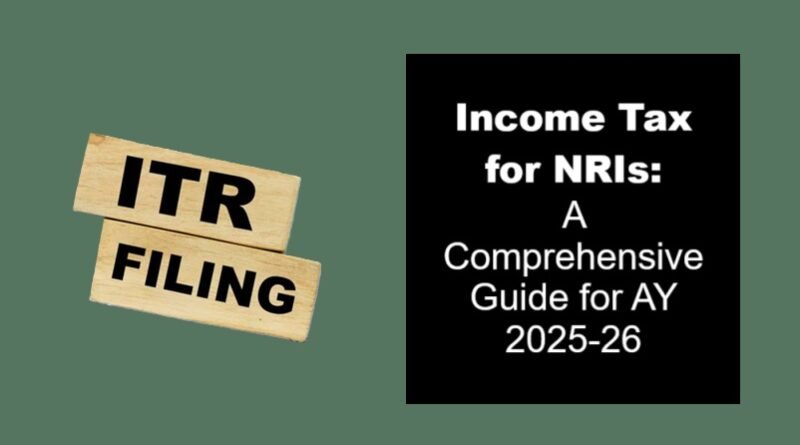Income Tax for NRIs: A Comprehensive Guide for AY 2025-26
Introduction to NRI Taxation
Non-Resident Indians (NRIs) are subject to different income tax rules than resident Indians. Understanding NRI tax obligations is crucial for compliance, investment planning, and avoiding penalties. This guide covers tax rates, exemptions, filing requirements, and key provisions applicable to NRIs for Assessment Year (AY) 2025-26.
Who is Considered an NRI for Tax Purposes?
According to the Income Tax Act, an individual is considered an NRI if they meet either of the following conditions:
- Stayed in India for less than 182 days during the Financial Year (FY)
- Stayed in India for less than 60 days in a financial year and less than 365 days in the last 4 years
For Indian citizens working abroad or crew members on Indian ships, the 60-day condition is extended to 182 days.
Taxable Income for NRIs in India
NRIs are taxed only on income earned or accrued in India. The following sources of income are taxable in India for NRIs:
- Salary received in India or for services rendered in India
- Rental income from property in India
- Capital gains from the sale of assets in India (property, stocks, mutual funds)
- Interest income from fixed deposits and savings accounts (subject to TDS)
- Income from business or profession established in India
Income Not Taxable in India
- Salary earned abroad
- Rental income from property outside India
- Capital gains from foreign investments
- Foreign bank interest
NRI Income Tax Slabs for AY 2025-26
NRIs follow the same income tax slab rates as resident Indians under the old tax regime unless they opt for the new tax regime.
Old Tax Regime (With Deductions & Exemptions)
| Income Slab | Tax Rate |
|---|---|
| Up to ₹2.5 lakh | Nil |
| ₹2.5 lakh – ₹5 lakh | 5% |
| ₹5 lakh – ₹10 lakh | 20% |
| Above ₹10 lakh | 30% |
New Tax Regime (Without Deductions & Exemptions)
| Income Slab | Tax Rate |
|---|---|
| Up to ₹3 lakh | Nil |
| ₹3 lakh – ₹6 lakh | 5% |
| ₹6 lakh – ₹9 lakh | 10% |
| ₹9 lakh – ₹12 lakh | 15% |
| ₹12 lakh – ₹15 lakh | 20% |
| Above ₹15 lakh | 30% |
TDS (Tax Deducted at Source) for NRIs
NRIs are subject to higher TDS rates on income earned in India:
- Rental Income: 30% TDS
- Fixed Deposit Interest: 30% TDS (No exemption under ₹10,000 like residents)
- Capital Gains:
- Short-term equity: 15% (20% from 23rd July 2024 onwards)
- Long-term equity (stocks, mutual funds): 10% tax (12.5% from 23rd July, 2024)
- Property sale: 20% (long-term), as per slab (short-term)
- NRO Account Interest: 30% TDS
- Professional Services: 10% TDS
NRIs can claim a refund if TDS deducted exceeds their tax liability by filing an ITR.
Deductions & Exemptions Available for NRIs
NRIs can claim limited deductions under the Income Tax Act:
- Section 80C (Up to ₹1.5 lakh):
- Life insurance premiums
- ELSS mutual funds
- Principal repayment on home loans
- Tuition fees for children in India
- Section 80D: Health insurance premium up to ₹25,000 (₹50,000 for senior citizens)
- Section 80E: Education loan interest deduction
- Section 80G: Donations to eligible charities
- House Property Benefits: Deduction of interest on home loans (Section 24b)
NRI Investment Taxation
1. NRO vs. NRE vs. FCNR Accounts
- NRO (Non-Resident Ordinary Account): Interest is taxable at 30% TDS.
- NRE (Non-Resident External Account): Interest is tax-free.
- FCNR (Foreign Currency Non-Resident Account): Interest is tax-free.
2. Capital Gains Tax on Property Sales
- Long-term (>2 years holding): 20% TDS after indexation
- Short-term (<2 years holding): Taxed as per income slab
- TDS Deduction: Buyer must deduct 20% TDS before paying the NRI seller.
ITR Filing for NRIs
When Should NRIs File ITR?
NRIs must file an ITR if:
- Total taxable income in India exceeds ₹2.5 lakh
- They wish to claim TDS refund
- They have capital gains (even below ₹2.5 lakh)
- They own more than one house property
ITR Forms for NRIs
| ITR Form | Applicable To |
|---|---|
| ITR-1 | Salaried NRIs with one house property (Income < ₹50 lakh) |
| ITR-2 | NRIs with capital gains, multiple properties, or foreign assets |
| ITR-3 | NRIs with business/professional income |
| ITR-4 | NRIs under presumptive taxation |
ITR Filing Process
- Login to the Income Tax e-Filing portal.
- Select the appropriate ITR form.
- Enter income, deductions, and tax details.
- Pay additional tax (if required).
- Submit and e-verify the return.
Double Taxation Avoidance Agreement (DTAA)
NRIs may face taxation in both India and their country of residence. The DTAA treaty helps avoid double taxation in two ways:
- Tax Credit: Claim credit for tax paid in India while filing tax returns abroad.
- Tax Exemption: Exempt income earned in India from tax in the foreign country.
NRIs must obtain a Tax Residency Certificate (TRC) from their resident country to claim DTAA benefits.
Consequences of Not Filing ITR for NRIs
- Late Fee: ₹5,000 (₹1,000 for income below ₹5 lakh) if filed after July 31, 2025
- Interest: 1% per month under Section 234A
- Loss of Refund: Unclaimed TDS remains with the government
- Legal Consequences: If income is taxable but ITR is not filed, prosecution under Section 276CC
Conclusion
NRIs must carefully manage their tax obligations in India. By understanding the taxability of income sources, applicable deductions, TDS rules, and DTAA benefits, NRIs can optimize their tax liabilities. Filing returns on time ensures compliance and helps avoid unnecessary penalties. Consulting a tax professional for cross-border tax planning can further simplify the process.
For AY 2025-26, ensure all financial transactions are well-documented and file your ITR before the due date to enjoy a hassle-free tax experience.

